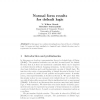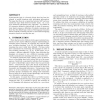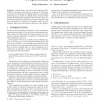224
Voted
NIL
1991
15 years 6 months ago
1991
In this paper we continue investigations of proof theory of default logic. It turns out that, similarly to classical logic, default theories can be represented in normal forms.
135
click to vote
ISMVL
1991
IEEE
15 years 6 months ago
1991
IEEE
We suggest a new representation of defeasible entailment and specificity in the framework of default logic. The representation is based on augmenting the underlying classical lan...
104
click to vote
KI
1995
Springer
15 years 6 months ago
1995
Springer
Abstract. We investigate the task of skeptically reasoning in extensionbased, nonmonotonic logics by concentrating on general argumentation theories. The restricted applicability o...
115
Voted
JELIA
2000
Springer
15 years 6 months ago
2000
Springer
In previous work, we developed a framework for expressing general preference information in default logic and logic programming. Here we show that the approach of Brewka and Eiter ...
112
Voted
FOAL
2007
ACM
15 years 6 months ago
2007
ACM
Nonmonotonic logic is a branch of logic that has been developed to model situations with incomplete information. We argue that there is a connection between AOP and nonmonotonic l...
108
Voted
SAT
2010
Springer
15 years 6 months ago
2010
Springer
Default logic is one of the most popular and successful formalisms for non-monotonic reasoning. In 2002, Bonatti and Olivetti introduced several sequent calculi for credulous and s...
128
Voted
KR
1992
Springer
15 years 6 months ago
1992
Springer
Abstract, We consider the problem of integrating Reiter's default logic into terminological representation systems. It turns out that such an integration is less straightforwa...
114
Voted
ECAI
1994
Springer
15 years 6 months ago
1994
Springer
Default logic, one of the best known formalisms to express common sense reasoning, does not allow to reason by cases in its standard formulations. We propose a natural and easy way...
115
click to vote
LPNMR
1997
Springer
15 years 6 months ago
1997
Springer
This paper introduces power default reasoning (PDR), a framework for nonmonotonic reasoning based on the domain-theoretic idea of modeling default rules with partial-information i...
118
Voted
ECAI
1998
Springer
15 years 6 months ago
1998
Springer
Abstract. Default logic is one of the most widely used formalisms to formalize commonsense reasoning. In this paper we analyze the complexity of deciding whether a propositional in...



